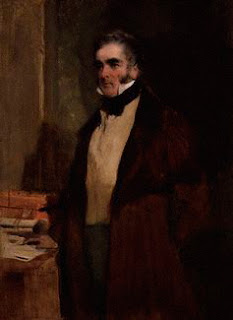 |
| Queen Victoria by Alfred Edward Chalon, 1838, National Galleries of Scotland |
From the Greville Memoirs:
August 30th. (1837) —All that I hear of the young Queen leads to the conclusion that she will some day play a conspicuous part, and that she has a great deal of character. It is clear enough that she had long been silently preparing herself, and had been prepared by those about her (and very properly) for the situation to which she was destined. The impressions she has made continue to be favourable, and particularly upon Melbourne, who has a thousand times greater opportunities of knowing what her disposition and her capacity are than any other person, and who is not a man to be easily captivated or dazzled by any superficial accomplishments or mere graces of manner, or even by personal favour. Melbourne thinks highly of her sense, discretion, and good feeling; but what seem to distinguish her above everything are caution and prudence, the former to a degree which is almost unnatural in one so young, and unpleasing, because it suppresses the youthful impulses which are so graceful and attractive.
 |
| Victoria Regina, June 20, 1837, by Henry Tanworth Wells, Royal Collection |
On the morning of the King’s death, the Archbishop of Canterbury and Lord Conyngham arrived at Kensington at five o’clock, and immediately desired to see ‘the Queen.’ They were ushered into an apartment, and in a few minutes the door opened and she came in wrapped in a dressinggown and with slippers on her naked feet. Conyngham in a few words told her their errand, and as soon as he uttered the words ‘Your Majesty,’ she instantly put out her hand to him, intimating that he was to kiss hands before he proceeded. He dropped on one knee, kissed her hand, and then went on to tell her of the late King’s death. She presented her hand to the Archbishop, who likewise kissed it, and when he had done so, addressed to her a sort of pastoral charge, which she received graciously and then retired. She lost no time in giving notice to Conroy of her intentions with regard to him; she saw him, and desired him to name the reward he expected for his services to her parents. He asked for the Red Eiband, an Irish peerage, and a pension of 3,000l. a year. She replied that the two first rested with her Ministers, and she could not engage for them, but that the pension he should have. It is not easy to ascertain the exact cause of her antipathy to him, but it has probably grown with her growth, and results from divers causes. The person in the world she loves best is the Baroness Lehzen, and Lehzen and Conroy were enemies. There was formerly a Baroness Spaeth at Kensington, lady-in-waiting to the Duchess, and Lehzen and Spaeth were intimate friends. Conroy quarrelled with the latter and got her dismissed, and this Lehzen never forgave. She may have instilled into the Princess a dislike and bad opinion of Conroy, and the evidence of these sentiments, which probably escaped neither the Duchess nor him, may have influenced their conduct towards her, for strange as it is, there is good reason to believe that she thinks she has been ill-used by both of them for some years past.1 Her manner to the Duchess is, however, irreproachable, and they appear to be on cordial and affectionate terms. Madame de Lehzen is the only person who is constantly with her. When any of the Ministers come to see her, the Baroness retires at one door as they enter at the other, and the audience over she returns to the Queen. It has been remarked that when applications are made to Her Majesty, she seldom or never gives an immediate answer, but says she will consider of it, and it is supposed that she does this because she consults Melbourne about everything, and waits to have her answer suggested by him. He says, however, that such is her habit even with him, and that when he talks to her upon any subject upon which an opinion is expected from her, she tells him she will think it over, and let him know her sentiments the next day.
The day she went down to visit the Queen Dowager at Windsor, to Melbourne’s great surprise she said to him that as the flag on the Round Tower was half-mast high, and they might perhaps think it necessary to elevate it upon her arrival, it would be better to send orders beforehand not to do so. He had never thought of the flag, or knew anything about it, but it showed her knowledge of forms and her attention to trifles. Her manner to the Queen was extremely kind and affectionate, and thej were both greatly affected at meeting. The Queen Dowager said to her that the only favour she had to ask of her was to provide for the retirement, with their pensions, of the personal attendants of the late King, Whiting and Bachelor, who had likewise been the attendants of George IV.; to which she replied that it should be attended to, but she could not give any promise on the subject.
 |
| William Lamb, Lord Melbourne (1779-1848), by Sir Edwin Landseer 1838 National Portrait Gallery |

I cannot begin to imagine the weight of responsibility placed on her young shoulders at her uncle's death. I have often wondered if the knowledge the throne would be hers almost from the moment of her birth helped her to prepare for the burden of it. When you know for certain you are destined for a position it can narrow your focus considerably. One wonders if the average young girl today would be as equal to the task as young Victoria was?